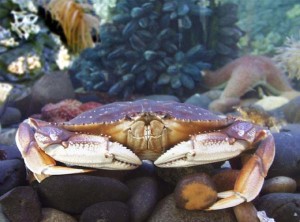Record Year for Crabbing Predicted
WDFW Forecasts Record Year for Dungeness Crab
 The Seattle Times reports the Washington Department of Fish and Wildlife (WDFW) is predicting a record year for dungeness crab.
The Seattle Times reports the Washington Department of Fish and Wildlife (WDFW) is predicting a record year for dungeness crab.
“Based on the crab abundance we’re looking at a projected harvest of 2.5 to 3 million pounds in Puget Sound,” said Rich Childers, the state Fish and Wildlife crab resource manager.
Anglers should be aware of state crabbing regulations:
- Five male Dungeness crab per person per day. Females are not to be retained.
- Six Red Rock crab per person per day of either sex may be kept.
- Male Dungeness crab must have a minimum carapace of 6 ¼ inches.
- Red Rock crab must have a minimum carapace of 5 inches.
- No pulling of gear one hour after sunset to one hour before sunrise.
- Dungeness crab must be reported on your catch record cards before returning your gear into the water.
- Your buoy must have your name and address plainly written on it. It’s a good idea to also have your phone number, so that if a lost pot is found, the owner can be easily contacted.
More information on crabbing in Washington can be found in this Salmon University article.
Salmon for Soldiers Golf Tournament Coming Up
 Alberbrook Golf and Yacht Club in Union, Wash. will be hosting the annual Salmon for Soldiers golf tournament on Monday, July 13 with a 9:00 a.m. start. Tee and green sponsorships are available for $50 each and will be used to support the group’s veteran fishing programs.
Alberbrook Golf and Yacht Club in Union, Wash. will be hosting the annual Salmon for Soldiers golf tournament on Monday, July 13 with a 9:00 a.m. start. Tee and green sponsorships are available for $50 each and will be used to support the group’s veteran fishing programs.
Salmon for Soldiers is a Washington state-based non-profit which provides fishing opportunities for U.S. military veterans, including those with PTSD, TBI and other debilitating challenges. The group’s major annual event is an August 29 expedition which will enlist more than 100 volunteer anglers to take 300 U.S. military veterans fishing. Salmon for Soldiers reports a waiting list of nearly 100 more veterans.
Pre-registration for the July golf tournament event is required; those interested in participating should call 253-227-2917 to reserve a spot for their team. More information is available on the Salmon for Soldiers website.
Chinook Mortality in Oregon Blamed on Water Temps
Elevated water temperatures are most likely the cause of spring Chinook salmon deaths in the Willamette River and some of its tributaries, according to biologists from the Oregon Department of Fish and Wildlife (ODFW). According to the ODFW, state biologists and survey crews have observed unusually large numbers of spring Chinook salmon carcasses in the Willamette, Clackamas, and Santiam rivers recently.
Spring Chinook salmon typically die in the fall after they have spawned. However, some also die before they are able to spawn as the result of stress, disease, and predation. This year, Chinook are dying earlier than usual, according to Tom Friesen, manager of ODFW’s Upper Willamette Research, Monitoring and Evaluation Program.
“Pre-spawning mortality is normal and happens every year to some extent,” said Friesen in a written statement. “But usually we don’t see dead spring Chinook in the mainstem Willamette until mid-summer.”
ODFW biologists say that high water temperatures likely contributed to the death of the fish. Chinook salmon are more prone to disease, injury, and stress when water temperatures exceed 60-degrees Fahrenheit.
Vessel Assist Becomes TowBoatUS
 BoatUS is renaming its West Coast-based Vessel Assist towing fleet to TowBoatUS. BoatUS, variously called the “AAA of boating” and ““The Nation’s Largest Recreational Boating Association,” purchased Vessel Assist in 2003. Prior to this rebranding, BoatUS offered the recreational boat towing service east of the Rockies under the TowBoatUS banner.
BoatUS is renaming its West Coast-based Vessel Assist towing fleet to TowBoatUS. BoatUS, variously called the “AAA of boating” and ““The Nation’s Largest Recreational Boating Association,” purchased Vessel Assist in 2003. Prior to this rebranding, BoatUS offered the recreational boat towing service east of the Rockies under the TowBoatUS banner.
According to the organization, BoatUS towing services responds to more than 70,000 requests for assistance from boaters annually. Its west coast-based towing operation includes VHF radio towers, or “high sites,” connected to BoatUS’ 24-hour Costa Mesa, California regional dispatch center.






